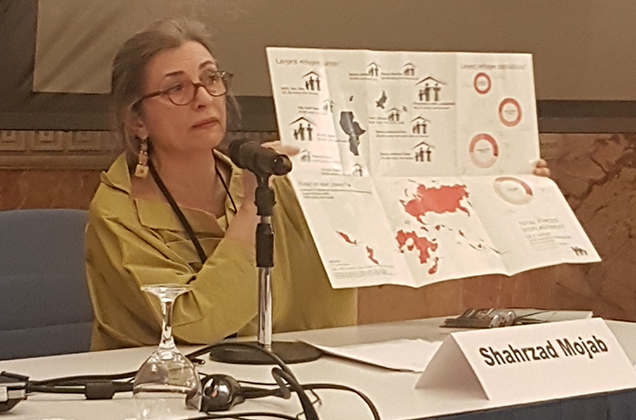30/05/2019
Organized by the Sabancı University Gender and Women's Studies Center of Excellence (SU Gender), Gothenburg University and Swedish Research Institute Istanbul with support from the Humanities and Social Sciences Foundation of Sweden, the "Gender and Education in a Local and Global Context" conference was held at Minerva Palas on April 26.
.
Organized by the Sabancı University Gender and Women's Studies Center of Excellence (SU Gender), Gothenburg University and Swedish Research Institute Istanbul with support from the Humanities and Social Sciences Foundation of Sweden, the "Gender and Education in a Local and Global Context" conference was held at Minerva Palas on April 26, 2019. The public event began with SU Gender Purple Certificate Project Coordinator Ceyda Karadaş and SU Gender education coordinator Emirhan Deniz Çelebi’s presentation of the "Purple Folder: Production of Gender-Sensitive Materials for High School Teachers". The Purple Folder is a set of toolkits developed to guide high school teachers in Turkey for the integration of gender perspective into their classes as part of the Purple Certificate Program implemented by Sabancı University Gender and Women’s Studies Center of Excellence (SU Gender) in association with the Sabancı Foundation. The presenters explained that the Purple Certificate Program began as a training program for teachers that was shaped according to the needs of the field and feedback from teachers, and evolved over time to become a model for developing gender-sensitive educational materials.
Implemented by the Sabancı University Gender and Women's Studies Center of Excellence in 2007, the program has reached 3500 teachers and 120 teaching faculty students in 12 years, and continues to promote gender equality across all levels of the education system.

The event continued with lectures by Shahrzad Mojab from the University of Toronto titled “Disrupted Lives and Interrupted Learning as Women/Girls Migrate", and Christopher Stroud from the University of Stockholm and Western Cape University titled "Language and Pluralities: Building New Futures". Stroud discussed his observations on the differences between monolingual and multilingual education systems based on his fieldwork in three countries.
The Effects of War and Violence on Learning Processes
Shahrzad Mojab spoke about the role of war and violence in shaping the learning processes of women on a global level, shared the details of the educational programs offered to migrants at her university, and emphasized that cultural integration trainings must deal with the causes and consequences of migration from a holistic point of view.
Mojab said, “I began to explore the effects of violence on learning in 1991, during the First Gulf War. One must consider awareness of social change, migration and employment (access to work), and modes of learning to understand the learning processes of migrant women. Through our work, we developed formal, informal and lifelong learning categories. For migrant women, the case is lifelong training rather than lifelong learning. We need to redesign the concept of learning. Migration is a long process. War has implications on learning and consciousness. That is why we need some tools and mechanisms. The past shapes women's ability to establish a routine and their modes of learning."
Mojab also said that education professionals should prioritize mobility trainings and offer training programs to young refugees.





